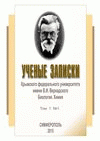A controlled, open, randomized study was conducted to assess the characteristics of the cognitive status of smoking and nonsmoking students of the Medical Institute of Tsiolkovsky Kaluga State University (Kaluga, Russia). Students were randomized into 2 groups: the first group of volunteers (n = 40) consisted of nonsmokers, the second group (n = 32) – smokers. To assess the cognitive status, the «10 words» and «Schulte tables» methods were used. The results of the study showed that the first reproduction of ten monosyllabic words when tested using the «10 words» method does not have statistically significant differences between the groups and allows us to state that the volume of short-term memory in smoking and non-smoking volunteers is practically identical. At the same time, further reproduction (second to fifth) indicates a reliable decrease in the level of memorization in volunteers of the second group compared to the first, amounting to 10–20 % (p<0.05). Evaluation of the volume of long-term memory (sixth reproduction) showed a statistically significant decrease in the parameter (by 34 %, p<0.05) in smoking students relative to non-smoking students. The assessment of the attention volume, its stability, and mental tempo using Schulte tables showed that in both the first and second groups of students, the task completion time was within the normal range: both non-smokers and smokers had sufficient stability of voluntary attention and mental activity tempo. However, the time spent working with the fifth table by smokers was 43 % higher than the same indicator by non-smokers (p<0.05), which affected the calculated indicators: the work efficiency in the second group was 24 % lower than the same parameter in the first, and mental stability was 18 % lower (p<0.05). The study allowed us to establish statistically significant changes in the parameters of the cognitive status of smoking students: with a fairly quick adaptation to the task, comparable in values with non-smoking volunteers, there is sufficient exhaustion of attention against the background of a decrease in mnemonic functions in smokers, which is confirmed by a decrease in the volume of long-term memory, concentration, work efficiency and mental stability.
cognitive status, smoking and non-smoking students, memory, attention
1. Gnuchih E. V. Issledovaniya innovacionnoy produkcii – elektronnyh sistem dostavki nikotina / E. V. Gnuchih, M. V. Shkidyuk, A. G. Mirgorodskaya // Vestnik VGUIT. – 2018. – T. 80, №3. – S. 265–271.
2. Aleshina T. E. K voprosu o territorial'nom raspredelenii onkologicheskih zabolevaniy v Kaluzhskoy oblasti / T. E. Aleshina, A. B. Zhukova // Ekologiya urbanizirovannyh territoriy.– 2020. – №4.
3. Chernova G. V. Vozrastnaya dinamika pokazateley serdechno-sosudistoy sistemy u detey shkol'nogo vozrasta (7-17 let) v pokoe i pri fizicheskoy nagruzke / G. V. Chernova, T. E. Aleshina
4. Simonova N. V. Vliyanie sutochnyh bioritmov na kognitivnyy status studentov vtorogo kursa, obuchayuschihsya po special'nosti Lechebnoe delo / N. V. Simonova, T. E. Aleshina // Uchenye zapiski
5. Gulyaeva A. S. Ocenka mnesticheskih funkciy u studentov-medikov v techenie uchebnogo dnya / A. S. Gulyaeva, N. V. Simonova, A. N. Romanova [i dr.] // Kardiovaskulyarnaya terapiya i
6. Tereschenko T. A. Osobennosti koncentracii vnimaniya u studentov vtorogo kursa v techenie uchebnogo dnya / T. A. Tereschenko, N. V. Simonova, T. E. Aleshina [i dr.] // Kardiovaskulyarnaya





